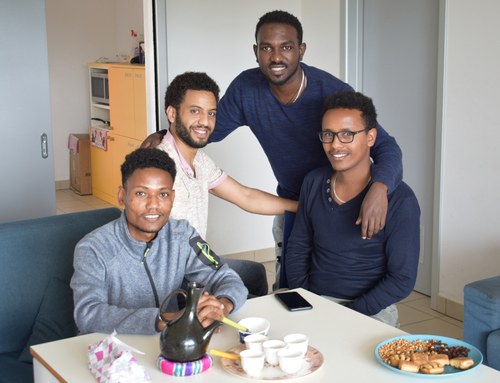
They are young students, in some ways exactly like so many other peers with whom every day they share not only the university classrooms, but also projects, aspirations for the future, difficulties and fears. At the same time their experiences made them, in spite of themselves, special: Biniam, Awet, Hadish, Sami and Yohannes, are five boys escaped from the dictatorship in Eritrea who, thanks to their dedication to study and to the UNI-CO-RE project, will be able to continue their university education at the oldest university in the Western world.
They are in fact the first to benefit from the new university corridors opened by the University of Bologna, together with an important network of partners, which will welcome refugee students already graduated from the three-year course and who want to continue their academic career in the capital of Emilia.
Welcomed by Er.Go., the regional company for the right to study, in their university residences, and followed by Next Generation Italy in the bureaucratic practices and in daily life, they were also assigned bridge families, to facilitate their integration in their new country and in the city. Assistance and help are also provided by the Archdiocese, Federmanager, the Ministry of Foreign Affairs and International Cooperation, Caritas Italiana, Gandhi Charity and Manageritalia Emilia-Romagna.
Despite the network of solidarity and protection formed around these young people, the expectation, entering the student housing given to them, is to be faced with people wounded by life, who see in this opportunity primarily an escape from a condition far from comfortable. Instead, you are greeted by perfect hosts who, between ginger coffee and a tray of dried fruit and appetizers, immediately create a pleasant feeling of 'home' and share stories that are in fact difficult, but full of humanity, hope, and desire for freedom. Freedom, above all, to choose one's own future.
"In Eritrea, once the compulsory schooling is over, those who are talented and have good grades can continue. All the others instead become soldiers. Boys and girls, without distinction," says Yohannes. And what if you're good enough to continue your studies? "You can do it, but once you graduate, the State will decide what you need to do, and it's almost always going to have no connection with your skills or passions. The State takes away your will, suffocates every idea. This is why we escaped, to be able to choose and be able to do something concrete, one day, when things will change."
The desire to return home one day, where they left their families, is strong and almost tangible. "No one escapes from Eritrea with their family," clarify the students, exchanging accomplices glances of those who know, because they have experienced it. And they tell you about a tormented country, theirs, where the only dream still intact is to make their children flee. "They all go away as soon as they are old enough to be able to look after themselves." They escape to Ethiopia, a country still very welcoming to refugees, but where they do not have the right to work, and towards a bigger dream, called Europe.
It comes naturally to us to ask how one can survive, alone, in a refugee camp where you have nothing, not even permission to earn a living. "The humanitarian associations distribute some food, and if someone is lucky enough to have a relative in Europe, they sometimes get money. Here, we live above all by sharing those small amounts," explains Awet. Sharing, the main theme of many of their stories, is also at the basis of the fortunate series of events that brought them to Italy. "We found out that there was this possibility and we immediately created groups on the internet to share the link to the call. It didn't seem real that such an opportunity could exist, but it was worth trying."
And when you ask what their reaction was when they were selected, the answer is again a little different from what you expect. "We didn't believe it until the end. Not because we didn't believe in the existence of the project, but because too many things could go wrong. The visa, in fact, arrived only two days before leaving," says Biniam, smiling at the memory of those uncertain days.
Actually, the boys smile a lot, they always smile. Because according to them the opportunity they got is too big to think about what didn't go well in their lives, to stop and count the things they didn't have. It would not be fair to those who remained at the refugee camp. "There were very good students, friends, who may have graduated a little earlier than what it was required by the call, or they still have graduate in few months. So they remained there for something they can't control. We have been fortunate, we can only be very grateful and work hard not to waste all this,” they say with a veil of regret that the possibility given to them was not available for others.
The personal redemption of the youth of an entire nation like Eritrea thus passes from the right to study and the opportunity to develop one's personal inclinations and interests. "It is important that the others, especially the younger ones who are now living our same experiences, see in us an example and understand that only by studying, improving ourselves and becoming useful to society, can we make a change. For ourselves, our families and our country,” adds Sami.
But what will be the academic path of the five UNI-CO-RE students at the University of Bologna?
Electronic and automation engineering, artificial intelligence and economics. Difficult paths, there is no doubt, but certainly these special students have been already able to demonstrate that their determination and desire to learn can take them far. Literally.